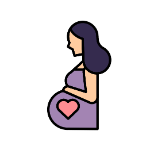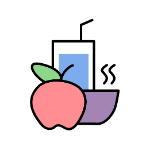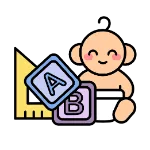
Childcare
Raising A Healthy Baby: A Guide To Nutritious Eating During The First Year
10 min | Updated on 11-05-2023 by HappyPreggie
(Image credits to Unicef)
As a new parent, your top priority will be to provide the best possible nutrition for your baby, especially during the first year as it is a critical time for growth and development, and the right nutrition can set the foundation for a lifetime of good health.
Navigating the world of baby nutrition can be overwhelming, as there’s countless opinions and options to consider. However, by learning the basics and knowing what to look for, you can feel confident in providing your baby with the nutrients they need to thrive. Keep reading to learn more and gain some tips and tricks to give your little one the best possible care!
Breastfeeding and Formula Feeding
(Image credits to Pampers)
Babies usually begin to exclusively breastfeed or be fed formula from birth until they reach about 4-6 months old, after which they can start consuming solid foods while still continuing to be breastfed or formula-fed. As they grow and develop, their solid food intake will increase gradually while their milk intake reduces.
The American Academy of Pediatrics (AAP) recommends breastfeeding for at least the first year of life, and you can continue beyond then if it is mutually desired by both you and your baby. Formula feeding, on the other hand, is typically used until the baby has fully transitioned to solid foods and no longer needs milk as their primary source of nutrition. However, this can vary depending on individual circumstances and the advice or guidance of a healthcare provider, such as your paediatrician or nutritionist.
Why Should I Breastfeed During The First Year?
- Breast milk provides optimal nutrition for your little one, including all the essential nutrients, antibodies, and enzymes they need to stay healthy and strong.
- It can help reduce the risk of sudden infant death syndrome (SIDS), childhood obesity, and certain illnesses later in life.
- Mums can benefit too! Breastfeeding can reduce the risk of postpartum bleeding and depression, promote bonding with your baby, and even lower the risk of certain cancers.
- Convenient and cost-effective. You don't need any special equipment, and breast milk is always ready for on-the-go!
What If I Cannot Breastfeed My Baby?
Breastfeeding is not always an option for every mother, and there are many reasons why some choose to formula feed instead. Some may have medical issues that make breastfeeding difficult, prefer to use formula, or have trouble with breastfeeding. Others may have busy work or lifestyle schedules that make it challenging to breastfeed, or they may not have enough support or resources available to them.
It's important to remember that the decision to breastfeed or formula feed is a personal one, and what works for one mother and baby may not be the same for another.
How Often Should I Feed My Baby?
When you're breastfeeding, it's recommended that your baby feeds around eight to twelve times a day. Each feed should be around 10 to 15 minutes per breast. If you're using formula, your baby should be fed six to ten times per day, including during the night.
As your baby grows and starts eating solid foods, they will gradually drink less milk or formula. To make the transition easier, start offering small amounts of solid food and gradually increase the amount while decreasing the milk or formula. Remember, all foods should be offered by spoon and not in the bottle.
Introducing Solid Foods
(Image credits to NYU Langone Health)
When babies reach 4-6 months of age, they are usually ready to try solid foods. This can be a fun and exciting time for parents, but it can also be a bit overwhelming. Here are some tips to help you prepare for this milestone moment:
- Talk to your paediatrician: Your baby's doctor can give you advice on when to start solid foods and what types of foods to introduce first. You can also discuss any concerns or questions you may have.
- Gather the necessary equipment: You'll need a high chair, bibs, spoons, and bowls. If you're planning to make your own baby food, consider investing in a food processor or blender.
- Choose the right foods: Start with single-ingredient purees of fruits and vegetables. You can gradually introduce new foods and textures as your baby gets used to eating solid foods.
- Introduce foods slowly: Offer one new food at a time, waiting a few days in between to watch for any signs of an allergic reaction.
- Be patient: It may take several tries before your baby likes a new food. Don't force them to eat it and don't give up too quickly.
- Watch for signs of readiness: Before you start introducing solid foods, make sure your baby is ready. Look for signs like good head control, the ability to sit up with support, and an interest in food.
If you're wondering what solid foods to offer your baby first, some great options include pureed fruits like apples, pears, or bananas, pureed vegetables such as sweet potatoes or carrots, and iron-fortified baby cereals like rice or oatmeal. .
How Do I Know When My Baby Is Hungry Or Full?
Sometimes babies cry or become fussy because they are hungry, tired, upset, uncomfortable, or need a diaper change or to be burped. It's important to look out for these signs to make feeding time more enjoyable for both you and your baby. Here are some general signs that your baby may be hungry:
- Smacking lips.
- Grabbing for or leaning toward your breast or bottle.
- Pointing at spoon, food or feeder’s hand.
- Moving hands to mouth and sucking his or her own hands.
Some signs that your baby is full include:
- Pulling away from bottle, spoon or breast.
- Falling asleep.
- Changing position, shaking head, keeping mouth closed tightly moving hands actively.
- Handing food back to the feeder.
Important Nutrients Baby Need During The First Year
(Image credits to FirstCry Parenting)
It's important to note that breast milk or formula should be the main source of nutrition for a baby in their first year. Introducing solid foods should be done slowly and with the help of a paediatrician to make sure the baby is receiving all the essential nutrients they need for their growth and development.
During the first year of life, there are many essential nutrients that a baby requires to support their growth and development. Some of these important nutrients include:
- Protein
Breast milk and formula both contain adequate amounts of protein.
- Iron
Iron-fortified infant cereals and pureed meats are good sources of iron.
- Calcium
Breast milk and formula both contain calcium, and it can also be found in fortified infant cereals and pureed vegetables.
- Zinc
Also helps support a growing baby’s immune system.
- Vitamins
Breast milk and formula both contain vitamins, but as babies start to eat solid foods, they can get vitamins from a variety of fruits, vegetables, and grains.
Important vitamins include vitamins A, D, E, C, and B.
- Healthy Fats
Breast milk and formula both contain healthy fats, and babies can also get them from foods like avocado, pureed fruits and vegetables, and fish.
Can My Baby Drink Plain Water?
Water is essential for your baby's body, as it helps regulate kidney function, metabolism, and transportation of nutrients. It also helps maintain their body temperature.
If your baby is aged 0-4 months and exclusively breastfed, they don't need any additional water as breast milk provides enough hydration. However, when you introduce solid foods to your baby, they'll need a little water to wash it down. But, it's crucial to note that giving water too early can harm your baby's health. Water intoxication can be dangerous, so it's best to wait until your baby is over 4 months old and eating solids before offering small sips of water.
It's always a good idea to consult with your baby's paediatrician before making any changes to their diet. They can guide you on feeding practices and ensure that your baby is receiving the right nutrients for their growth and development.
Common Feeding Challenges
(Image credits to iStock)
There can be some common feeding or nutrition challenges that you and your baby might encounter during the first year of life, including:
- Refusal to eat
- Allergies and intolerances
- Digestive issues
- Overfeeding or underfeeding
- Vitamin and mineral deficiencies
- Picky eating habits
It's crucial to provide your baby with the right nutrition during their first year of life to support their growth and development. From breastfeeding to introducing solid foods, there are many ways to provide your baby with the nutrients they need to thrive. Remember to consult with your paediatrician, lactation consultant, or a registered dietitian if you have any concerns or questions about your baby's nutrition. By making informed choices and being flexible with your feeding plans, you can help establish healthy eating habits for your baby that can last a lifetime.
Join the largest support network for family health and well-being. Ready to get started?
Get started
















